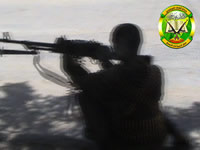June 16, 2010 | FDD’s Long War Journal
Hizbul Islam faction in southern Somalia defects to Shabaab

The leader of Hizbul Islam forces in the town of Beledweyne, the provincial capital of Hiran, declared his allegiance to Shabaab during a “landmark ceremony,” Garowe reported.
“We are hereby declaring our resolve to unite with our fellow jihadists (holy warriors) in this strategic Hiran region,” Sheikh Abdulkadir Haji Ahmed told a crowd in Beledweyne. “Unity is certain to arouse strength. I am an elder and the sheikh of Hizbul Islam in this territory and I am leading you to unite with your fellow jihadists.”
The town of Beledweyne is currently under Islamist control, although it has changed hands multiple times with Eithiopian and Somali forces. Before the merger, Shabaab and Hizbul Islam had previously split the city in half and fought together against the weak, UN and African Union-backed Transitional Federal Government. Beledweyne sits at a major crossroads that connects southern Somalia with the northern autonomous regions of Puntland and Somaliland.
The defection of the Beledweyne faction from Hizbul Islam is the latest blow to the Islamist group, and another major victory for its rival, Shabaab. In February 2010, the Ras Kamboni Brigade, one of four major groups that make up Hizbul Islam, split off and pledged allegiance to Shabaab and al Qaeda. Hassan Turki, the leader of the Ras Kamboni Brigade, confirmed the merger with Shabaab and said he made the decision to aid in “the unification of all Mujahidins and Muslims.”
The split angered some in Hizbul Islam. Just days after Turki's announcement, Bare Ali Bare, a deputy commander of the Ras Kamboni Brigade, denied reports that his group had joined Shabaab.
Shabaab quickly silenced Bare by executing him in early March at the Bakara market in central Mogadishu. No person has since stepped forward to deny that the Ras Kamboni Brigade has joined Shabaab.
Shortly thereafter, Hizbul Islam responded by assassinating Sheik Da'ud Ali Hassan, the leader of the Ras Kamboni Brigade in the southern town of Dhobley. Hizbul Islam may also have been behind an assassination attempt on May 1 against Sheik Fuad Mohammed Khalaf, a top military commander of al Qaeda-linked Shabaab in Mogadishu, in which dual blasts killed 40 people at a mosque in the Bakara market in Mogadishu.
Hizbul Islam is a radical Islamist group that is led by Sheikh Hassan Dahir Aweys, who is wanted by the US for his ties to al Qaeda. Aweys co-led the Islamic Courts in 2006 until the group was ousted from power during the Ethiopian invasion in December 2006. Last September, Aweys advocated for more suicide attacks in the country, just days after suicide bombers struck an African Union base in Mogadishu.
Hizbul Islam was created in January 2009 with the merger of four separate Islamic groups: Aweys' Alliance for the Re-Liberation of Somalia-Eritrea; the Ras Kamboni Brigade; Jabhatul Islamiya (the Islamic Front); and Anole.
Hizbul Islam has competed for the attention of top al Qaeda leaders. In April, a top Hizbul Islam leader and spokesman welcomed Osama bin Laden and other foreign fighters to Somalia and asked them to fight against African Union and Somali forces.
Although Shabaab and Hizbul Islam sought to merge forces during the summer of 2009, the alliance was frayed by local disputes between factions of the two organizations. Relations between Shabaab and Hizbul Islam worsened after the groups began to battle in the southern city of Kismayo over control of the port.
Clashes between Shabaab and Hizbul Islam have persisted in southern Somalia, but Shabaab has had the upper hand. Despite the intra-Islamist fighting, the weak Transitional Federal Government, backed by thousands of African Union peacekeepers, controls only small enclaves within the capital of Mogadishu, and little else. A pro-government Sufi Islamist militia called Ahlu Sunnah Wal Jama'a controls some regions in central Somalia and often clashes with Shabaab and Hizbul Islam.